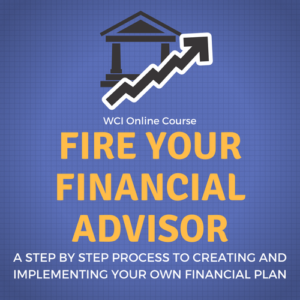(Today’s guest post come to you from David Rosenstrock, who is a certified financial planner with an MBA and the Founder of Wharton Wealth Planning, LLC.)
The daily tasks and responsibilities of a doctor are challenging and can frequently involve a wide range of patients and functions, including many of the administrative aspect of running a team and a business. As a physician, you want to make the smartest choices with your money. Financial surveys have shown medical professionals, on average, tend to be risk averse. However if you have a long time horizon until retirement you are in a good position to take on calculated investment risk. The good news is that you can manage investment risk based on how and where you invest your money. Pursuing financial choices based in proven strategies and principles can help reduce stress and even burnout, which has become more common in the field of healthcare services (and a range of other occupations) in the post-pandemic world.
There are several areas outside of retirement account planning that are very important to consider. As a physician, you also want to focus on taxable brokerage accounts and related strategies. Because your risk of job loss is lower than that of many other professionals, you can take more investment risk. But it must be smart, calculated risk. That usually means being broadly diversified.
Based on your high tax bracket, investments need to be tax sensitive. There are numerous strategies to help save you money at tax time:
First, keep turnover low and keep tax-inefficient investments in retirement accounts (not in taxable accounts). High turnover and active investment strategies in a taxable account can cost significant additional taxes into the hundreds of thousands of dollars on larger portfolios.
You also want to avoid holding onto underperforming investments because you may have had them a long time and became emotionally attached. Use tax loss harvesting in these instances if necessary. Tax-loss harvesting is when underperforming securities are sold at a loss to offset gains made elsewhere in the portfolio. The proceeds from that sale can then be used to invest in similar investments. This can dramatically reduce a client’s tax bill.
Also, you should always try to maximize charitable contribution deductions- One way to do this is by selecting highly appreciated assets when contributing to charitable causes. This can reduce your tax bill and increase your deduction. There are plenty of other strategies to discuss further depending on specific situations.
In talking to clients over the years, I have learned that a good way to drive yourself crazy is to check on your stock prices every single day. Studies have shown that short-term reactions to market news can cost investors around 30- 40% of expected returns.
When assessing investments and portfolios, focus on several areas:
(1) Asset allocation and diversification involves the composition of fixed income and equity categories and developing a portfolio that can perform in the long term under a wide range of circumstances.
(2) Tax efficiency can relate to investment turnover in individual stocks, bonds, mutual funds, and exchange traded funds (ETF’s) that can lead to short-term and long-term capital gains. Mutual funds may have significant embedded gains and in some instances you can owe taxes for economic gains you never realized based on the timing of your purchase and the structure of mutual funds.
(3) Risk reward involves understanding valuation and return potential. There are many good businesses and sectors to invest in, but if their stocks are priced too high they may not make good investments.
(4) Last, cost effectiveness involves costs involved with investment strategy or category.
Risk tolerance and investment horizon are factors that need to be considered to determine an appropriate portfolio. It can be necessary to perform annual or semi-annual reviews to monitor the portfolio and, if necessary, rebalance your portfolio based upon individual needs, goals and objectives. It is important to take a long-term view that enables investments to compound over time. There are many investment strategies available, from aggressive to conservative. The right selection should be customized and depends on the individual’s personal situation and circumstances.
Equally as important as contributing to your retirement accounts is the order or sequence in which you invest in these accounts. The sequence you use to invest money may have implications as to whether or not you are able to take advantage of tax deductions and pay less at tax time as well as what sort of taxes you may have to pay in the future when you make withdrawals. You should be maxing out your 401k/403b/SEP IRA/ Solo 401(k) each year, then your Backdoor Roth IRA, and then your individual/joint taxable account.
Also, on the topic of protecting and growing your wealth it is worth mentioning that it is important to play ‘defense’ as well as ‘offense’. If you’re concerned about protecting your wealth, one thing you can also do is to use a Limited Liability Company or LLC for risky assets. High-risk investments like a rental property open you up to potential insurance claims or lawsuits that can have a very large impact on your financial well-being.
Also, if you have accumulated some assets over your career then an umbrella policy is also likely in your best interest. This policy is separate from your professional liability coverage. Umbrella Protection is the easiest way to add liability coverage for you personally and at a very low cost. This policy will protect you if you’re sued, or if you cause someone injury. This policy should be viewed as a secondary policy — a “back up” to your traditional homeowners, auto, and/or renter’s insurance. Your policy should cover: (1) Legal fees (2) Your future salary if you owe your future earnings to the plaintiff in a case against you (3) and your current assets. Each state has its own exclusive rules, and those should dictate your asset protection plan. Also, this is vital if you have guests to your house frequently, children that have play dates at your house, or kids starting to drive your cars.
Selecting the right mix of investment strategies and asset protection defenses to complement your retirement planning strategies is a crucial step in optimizing your chances for financial security and success. Having a well thought out plan in place can help reduce the stress and distractions that personal finance topics often present.
(David Rosenstrock is the Director and Founder of Wharton Wealth Planning, LLC. He earned his MBA from the Wharton Business School and B.S. in economics from Cornell University. He is also a CERTIFIED FINANCIAL PLANNER™. David lives in New York with his wife and their two very active children.)





